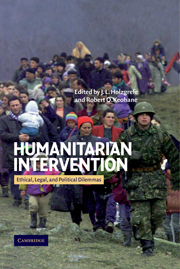Book contents
- Frontmatter
- Contents
- List of contributions
- Acknowledgments
- Introduction
- PART I The context for humanitarian intervention
- PART II The ethics of humanitarian intervention
- 3 The liberal case for humanitarian intervention
- 4 Reforming the international law of humanitarian intervention
- PART III Law and humanitarian intervention
- PART IV The politics of humanitarian intervention
- Select English language bibliography
- Index
3 - The liberal case for humanitarian intervention
Published online by Cambridge University Press: 27 July 2009
- Frontmatter
- Contents
- List of contributions
- Acknowledgments
- Introduction
- PART I The context for humanitarian intervention
- PART II The ethics of humanitarian intervention
- 3 The liberal case for humanitarian intervention
- 4 Reforming the international law of humanitarian intervention
- PART III Law and humanitarian intervention
- PART IV The politics of humanitarian intervention
- Select English language bibliography
- Index
Summary
Introduction
In this chapter I argue that humanitarian intervention is morally justified in appropriate cases. The argument centrally rests on a standard assumption of liberal political philosophy: a major purpose of states and governments is to protect and secure human rights, that is, rights that all persons have by virtue of personhood alone. Governments and others in power who seriously violate those rights undermine the one reason that justifies their political power, and thus should not be protected by international law. A corollary of the argument is that, to the extent that state sovereignty is a value, it is an instrumental, not an intrinsic, value. Sovereignty serves valuable human ends, and those who grossly assault them should not be allowed to shield themselves behind the sovereignty principle. Tyranny and anarchy cause the moral collapse of sovereignty.
I supplement this argument with further moral assumptions. The fact that persons are right-holders has normative consequences for others. We all have (1) the obligation to respect those rights; (2) the obligation to promote such respect for all persons; (3) depending on the circumstances, the obligation to rescue victims of tyranny or anarchy, if we can do so at a reasonable cost to ourselves. The obligation in (3) analytically entails, under appropriate circumstances, the right to rescue such victims – the right of humanitarian intervention. Because human rights are rights held by individuals by virtue of their personhood, they are independent of history, culture, or national borders.
- Type
- Chapter
- Information
- Humanitarian InterventionEthical, Legal and Political Dilemmas, pp. 93 - 129Publisher: Cambridge University PressPrint publication year: 2003
- 42
- Cited by



